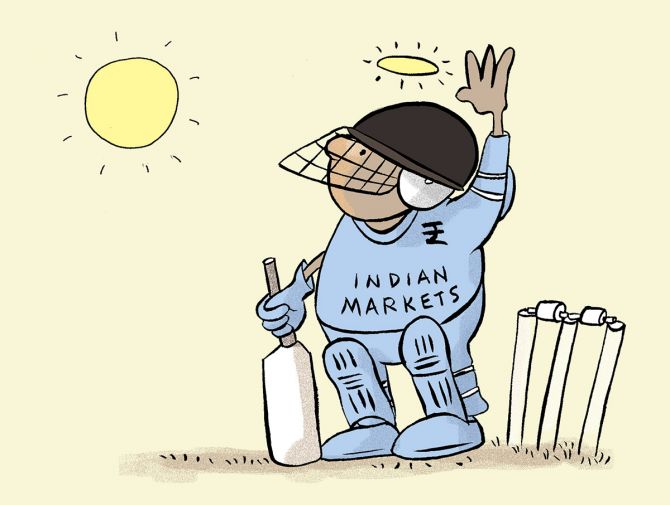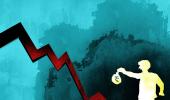'People trust India and Indians a lot more than they trust China and the Chinese.'

Indian markets are just catching up with their global peers after years of underperformance, said Shankar Sharma, founder, G Quants at the Business Standard BFSI Insight Summit 2022 in Mumbai.
Every equity market across the globe -- from Japan to Vietnam and Zimbabwe -- has and will have its day, and Indian markets are having their day right now, Sharma said.
India, he said, has a number of factors working in its favour, especially in a post Covid world where the trust on China and Chinese companies has gone down considerably.
Taking an analogy to cricket where the Indian economy and markets could hit their troubles out of the park, Sharma said the pitch for India was reasonably flat, the ball reasonably old and the sun (for India's economy) is shining bright.
Add to that the fact that the bowlers (negative sentiment) are not bowling too well.
All these are critical ingredients, he said, augur well for the markets.
Moreover, there are some positive qualities for which India is being liked.
"We are the good boys of the world and people still like us. People trust India and Indians a lot more than they trust China and the Chinese. And that is a big factor in the post Covid world. We have generally been a well-behaved student in the world economic landscape, and we will get our rewards for being that 'nice guy'," Sharma explained.
"The good boy qualities may make you look a loser for some time, but good boys will finish first. This is our chance to finish first rather than finish last as we have done in the past," he said.
From a historical perspective, if one looks at the period between 2010 when the world was emerging from the global financial crisis till March 2020, the markets, Sharma said, have given abysmal returns.
The Sensex in January 2008 was at around 16,000 levels and hit 37,000 levels by February 2020.
The index surged 50 per cent over a period of nearly 13 years (in rupee terms), which is 4 - 5 per cent return on a compounded basis (CAGR) per year.
Even fixed deposits, he said, would have given a better return over this time period.
"In dollar terms, Indian equities have given a negative return for almost 12 - 13 years prior to Covid in 2020. Post Covid, the returns have been good.
"This is nothing but a correction after a long period of abysmal returns.
"Markets are playing a cyclical catch-up. Markets are always cyclical; we romanticise the good part and ignore the bad part," Sharma said.
Economic growth
Economic growth in India, he believes, will slow down next year as it battles factors like the crisis in Ukraine as well as local macro challenges.
The Indian economy, Sharma believes, is likely to grow at 6 per cent in fiscal 2023-24 (FY24) even as global growth remains modest.
"India has been a conservative country by way of its economic management and has done well every time there was a global crisis.
"When I say conservative, it means the broad measures, for instance, our internal debt to GDP, and external debt to GDP show the degree of conservatism.
"The government should avoid any big bang policy measures. We don't want adventurism here," he said.
The Reserve Bank of India, Sharma believes, should not have hiked interest rates in a bid to combat rising inflation, but should have analysed the interest rate sensitivity of the inflation basket.
"Ultimately, you end up hurting growth without hurting inflation by raising interest rates. This was a mistake the United Progressive Alliance government made under RBI Governor Subbarao.
"Somebody has to someday stand up and say what we are doing has no effect on the villain (inflation) we are trying to kill. Instead, we ended up killing the hero, and the hero is growth," he said.
In terms of policy, Sharma believes the worst thing Indian policymakers can do is to start copying the US in terms of fiscal profligacy.
"We can't copy a rich man's game and hope to survive on that," he said.
In the Budget in February, Sharma said, the government should not tinker around the capital gains tax structure either by increasing the long-term capital gains tax or the tenure of holding the asset(s).
"Everything keeps creeping up once they open the door to some taxation. It never goes back. I just hope they don't do that. The equity markets have been buoyant.
"Government needs good equity markets to do a lot of the things it needs to do," Sharma said. "So, they should be very rational in these things."











